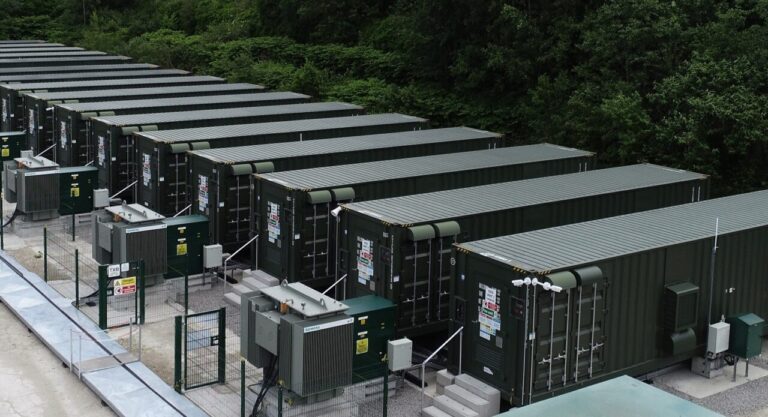A report published today (2 May) by industry association RenewableUK found that the total pipeline of battery projects has reached 95.6 GW, an increase of two-thirds on last year.
The increase of 67.4% (38.5 GW) from 57.1 GW is the second consecutive twelve-month period in which the pipeline has increased by this percentage. The total includes battery projects that are operational, under construction, approved or planned.
RenewableUK’s director of future electricity systems, Barnaby Wharton, said: “It’s great to see the UK’s battery storage pipeline growing by two-thirds in 12 months for the second year running. Investor interest in entering this fast-growing market remains enormous.”
Operational battery storage capacity has increased to 4.4 GW and the capacity of projects under construction has reached 4.3 GW. The average capacity of the projects for which a building permit is submitted has increased by 53 MW or 196% – from 27 MW in 2019 to 80 MW today.
The chart below shows the total UK battery project portfolio in megawatts.

Battery storage is critical for the security and flexibility that will make the future energy system resilient and reliable. Its effective use will also deliver cost savings and benefits to the energy system by allowing energy produced during times of high generation to be stored and used during peak times.
Wharton added: “Batteries play a key role in ensuring that electricity supply always meets demand. While there has been significant project uptake, we are still a long way from achieving the 55 GW of short-term flexibility by 2035 that the government says it needs in its Review of Electricity Market Arrangements.
“We have the potential to act much faster by accelerating the process of approval and connection of vital energy storage projects to the electricity grid.”
Battery storage installations are on the rise
In April, SSE Renewables launched its first operational battery energy storage system (BESS) with a capacity of 50 MW/100 MWh.
A recent one Solar energy portal blog discussed how Britain exceeded 1GW of installed energy storage capacity, the factors behind the current push from 1GW to 10GW, and the annual deployment that can be expected in the coming years as a result.
According to statistics from the Microgeneration Certification Scheme (MCS), battery storage installations rose 707% year-on-year in March 2024, exceeding 1,000 installations for only the second month in the program’s history.
Another report recently released by RenewableUK showed that building energy storage projects next to wind farms reduces the costs of the electricity system and increases energy security.
The report sets out a case for reforming the planning system and introducing financial support mechanisms to encourage co-location in clean electricity generation sites in the UK.
Wharton said: “By improving the planning system and implementing reforms to financial support mechanisms to encourage more battery projects to locate in locations where clean electricity is generated, we can significantly reduce the cost of building and operating batteries.”


